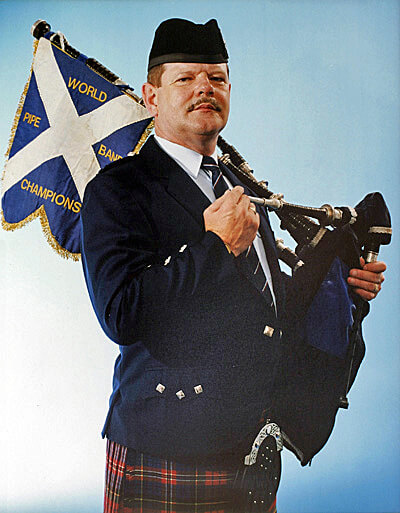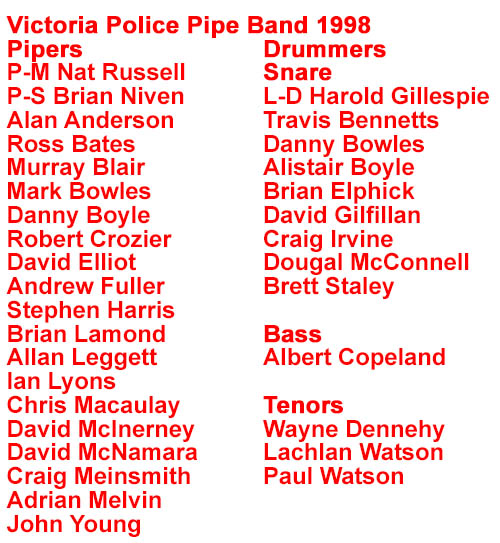Down under, up and over: the Victoria Police World’s win 20 years later
The Russell effect

There are few people in piping and drumming as intensely committed as Nat Russell. He continues to serve full-time with the Victoria Police Force, and has been a career police officer. (Unfortunately, due to the stipulations of his job, Russell is not allowed to conduct media interviews, so could not contribute to this piece.)
Russell’s intensity and dedication to winning the World’s rubbed off on the members of the band. They quickly got on board with his desire for competition success combined with musical excellence.
“I do not believe that the band would have won the World’s if Nat had not been there,” Niven says. “His arrival gave the impetus to the band to try harder and to believe that at some stage we could perhaps win the World’s.”
Russell also introduced a relatively new approach to managing a top-flight band. Traditionally, the pipe-major and lead-drummer would take sole responsibility for virtually every aspect – music, tuning, practices, etc. – Russell divvied up the tasks.
“Nat was keen for others to help out and, at times when the pipe-major in the majority of Grade 1 bands did it all themselves, he took the approach that, if someone was better at doing something, then why not use them – something I think most bands do these days,” Niven continues. “Nat was smart enough to use the players in the band to the band’s advantage. For example, Robert Crozier and Ross Bates looked after the chanters, and both had a very keen ear and would accept nothing but as close to perfection as was possible. Nat and I would pour through the reams of music that the band would receive and work on our medleys as well as concert material. But he was certainly the driving force behind the band and virtually organized all the finances by himself to enable the band to travel to Scotland each year.”
A native of Scotland, Brian Lamond was a piper in the band for three years, including 1998. He joined after Murray Blair heard him busking on a bridge in Melbourne, invited him to a practice, and Lamond passed the audition.
 “I think it was the mission of the band and Nat in particular to win the World’s,” Lamond says. “Although the band played just as well without Nat playing, without his drive and ambition it wouldn’t have happened. He put that band together and was clever enough to let the really talented people in the band do a lot of the work for him, but nothing happened in the band without his approval, and he made us work hard.”
“I think it was the mission of the band and Nat in particular to win the World’s,” Lamond says. “Although the band played just as well without Nat playing, without his drive and ambition it wouldn’t have happened. He put that band together and was clever enough to let the really talented people in the band do a lot of the work for him, but nothing happened in the band without his approval, and he made us work hard.”
Lamond would later return to Scotland, for a time serving as pipe-major of the now defunct Grade 1 Dysart & Dundonald.
Lyons agreed that the whole thing would not have happened without Russell. “Nat had a passion and drive that I’ve never seen the like of before. A determination beyond all obstacles. Nat was a hard taskmaster who knew exactly what he wanted and how to achieve it. He realized a dream for many of us that we could never have imagined and deep down we all owe him a debt of gratitude for taking us on that amazing journey. Looking back now, it’s only with great admiration for Nat, of the achievement that we shared. Without him, it simply would never have been.”
A good pipe-major not only will lead by example, but he will motivate his ranks to achieve their best, trust their abilities and psychologically agree that they deserve success as much as anyone. Easier said than done. The difference between first and second can come down to temperament and attitude.
“Nat started to make the people involved believe that they belonged in that Grade 1 arena, alongside the bands we only saw via grainy old videos and tapes that were copies of copies of copies,” Fuller says. “He brought the cut-throat, whatever-it-takes attitude that was standard practice in the scene ‘up north’, and he was able to leverage the Aussie talent and ingenuity that he had at his disposal.”
Assembling a group of top-flight players is the first part of the challenge. The next part is keeping their egos in check, particularly as a band achieves ever-increasing success. A pipe-major has to both feed and temper those egos. It’s a delicate balance of convincing players that they can be the best, yet still reminding them that they have a lot to learn. Victoria Police and its leaders were able to ride that fine line.
“[Nat] had to handle some players like myself who thought we knew it all at the time,” says piper Adrian Melvin, another Scottish immigrant to Australia and now living in Chicago. “Now that I have been a pipe-major, I realize how a big part of the job is managing the people in the band and keeping them focused on the goals.”

NO COMMENTS YET